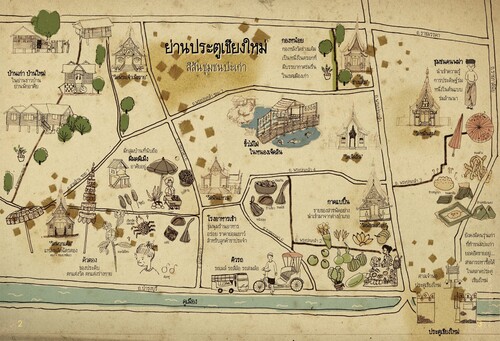Urban archives to imagine cities of the future
Annalaura Turiano, PhD, Head of Dissemination and Publications for the Archival City programme, ACP Laboratory
As a result of four years of work, the Archival City project researchers share tools and data for the management, use and promotion of urban archives. The aim of their approach can be summarised in two words: understand and share.
A bridge with a deck that is an open book - the objectives of the Archival City project can be summed up in its logo: to imagine future cities by integrating the data of the past in an open and shared way. In concrete terms, by analysing the way in which cities create and store their archives, the research teams aim both to develop reflection around urban development challenges and encourage a shared archival management methodology, in a spirit of sharing and openness. Because the aim of Archival City is also to make data accessible to as many people as possible.
Sharing urban archives
Funded by I-Site FUTURE, Archival City builds on the approach developed in the Open Jerusalem project, expanding it to five other cities with specific challenges: metropolisation (Greater Paris), displacement of archives (Algiers), long-term management (Bologna), risk management (Quito), diversity of languages (Jerusalem) and documentation of the ordinary city (Chiang Mai).
The research is undertaken by teams of historians, architects and archivists, including several members of the ACP Laboratory at Université Gustave Eiffel. It aims to provide tools to better orient oneself in urban archives, as well as to make information accessible to non-specialists. The researchers wish to address a broad scientific community and anyone interested in questions relating to modern cities, on subjects such as urban planning and heritage. Beyond that, they seek to make research data more accessible to the general public, in line with the principles of open science. The datasets shared online are available in their original languages (Spanish, French, Italian, Thai, Arabic and Hebrew) and described, at the very least, in English.

New tools for urban archives
Knowledge-sharing requires suitable tools for analysis and distribution. The first is AtoM, anopen source tool that makes it possible to process data according to the standards of archival description in force, before it is published online on Nakala, a research data repository for the humanities and social sciences.
For certain study fields, visualisation tools were specifically developed. This was the case for the 3D modelling of Quito during the Incan era, for instance, which provided a scientific and pedagogical interactive reproduction to be used by museums and schools.Lastly, data and research papers are an additional shared tool. These publications aim to present scientific research methods rather than results and outcomes.

The example of the administrative directories of Paris and the Seine Prefecture
An Archival City team that was interested in studying “Greater Paris” encoded a set of administrative directories listing the personnel and allocations of services in the Seine Prefecture and the City of Paris between 1883 and 1970.
Objective: to make these directories accessible online for free and complete consultation, restored to their historical context.
The first step, launched by the staff at the Archives of Paris, was to digitise the documents. However, the scans produced using OCR (optical character recognition) presented a high level of error. They were reworked by the Archival City digital humanities team, using the automatic text recognition software eScriptorium, but this proved to be a fastidious task due to the disparity of the initial documents. The scans were then corrected manually when encoded in XML-TEI format, which produced machine-readable text by adding tags to interpret the documents’ structure. The TEI documents were therefore standardised and a section was added to explain the methodology applied, making them accessible to qualified persons who could improve them. The last step was to design a visualisation tool aimed mainly at researchers in the fields of urban planning and transport. This would allow them to navigate through 37 digitised directories and extract data in different formats (PDF, mindmap, CSV).
Glossary
Description standard: provides a common base of descriptive elements to improve research, readability and interoperability of data, beyond the descriptive formats specific to each scientific field. The Dublin Core description standard was created in 1995 and made an ISO standard in 2003. It is used by the Nakala social sciences and humanities research repository and by the Bibliothèque Nationale de France, to reference data in a simple and easily interoperable format: title, creator, subject, language, rights, etc.
Data paper: free-access scientific publication, subject to peer validation, with the main aim of describing one or multiple datasets - rather than results - and the method used to obtain the sets, to make it possible to reuse them. Data papers help increase the visibility and accessibility of research data, thereby increasing their scientific contribution status.
Interview performed by the Kogito agency.
Identity card of dataset
| Data accees: | https://nakala.fr/collection/10.34847/nkl.653eda53 |
| License: | CC BY NC SA 4.0 |
| Production: | 2023 |
| Citations: | Lecat, Paul (2023) «Archival City Greater Paris- Seine 54» [Dataset] NAKALA. https://doi.org/10.34847/nkl.f7a3nq50 Lesieur, Paul (2023) «Archival City Greater Paris -Database administration of public roads (1850-1980)» [Dataset] NAKALA. https://doi.org/10.34847/nkl.fabf4xj6 Carnielli, Clément (2023) «Archival City Bologna -Medieval Bologna Database» [Dataset] NAKALA. https://doi.org/10.34847/nkl.3915o392 Espinosa, Carlos (2023) «Archival City Quito- 3D modelling Quito 1532» [Image] NAKALA. https://doi.org/10.34847/nkl.f6323el0 Arguello, Gabriela (2023) «Archival City Quito-The National Archive of Communes (1937-1973)» [Image] NAKALA. https://doi.org/10.34847/nkl.cb00f4k3 Derkinderen Lombeyda, Jeroen (2023) «Archival City Quito- Records of Andeanism (AEAP, AENH, Meza family)» [Image] NAKALA. https://doi.org/10.34847/nkl.84cbt8g3 Cabrera Hanna, Santiago ; Sanmartín Monteros, Natasha (2023) «Archival City Quito-Session minutes of the Centro Católico de Obreros- CCOQ (1906-1983)» [Image] NAKALA. https://doi.org/10.34847/nkl.cfce6tvs |
| Contact: | Annalaura Turiano, PhD, Head of Dissemination and Publications for the Archival City programme, ACP Laboratory |
| URL: | https://archivalcity.hypotheses.org |
| Key words: | archives, urban history, urban planning, heritage |

![[Translate to English:] Licence creative commons BY-SA 4.0 [Translate to English:] Licence creative commons BY-SA 4.0](https://reflexscience.univ-gustave-eiffel.fr/fileadmin/ReflexScience/Accueil/Logos/CCbySA.png)